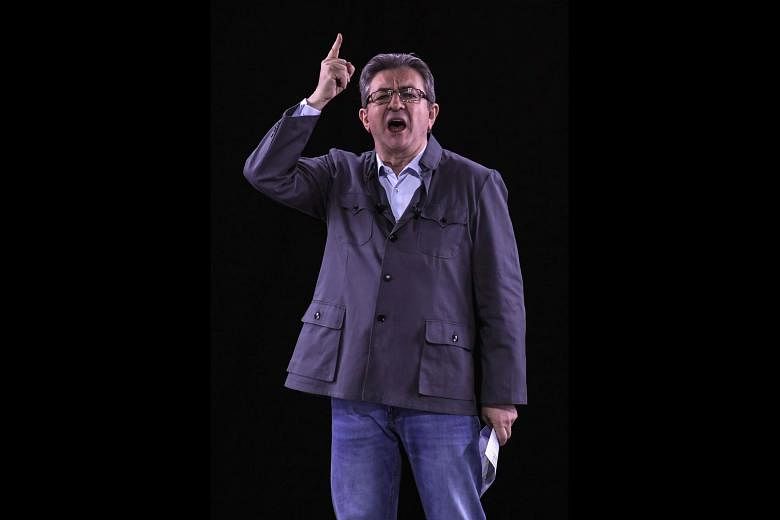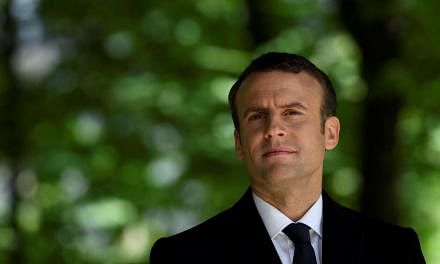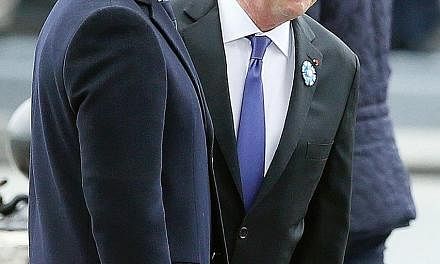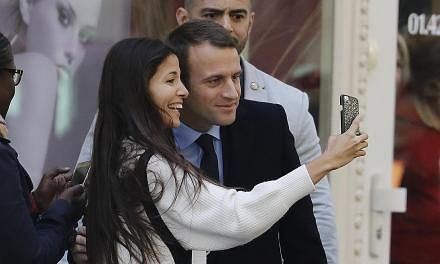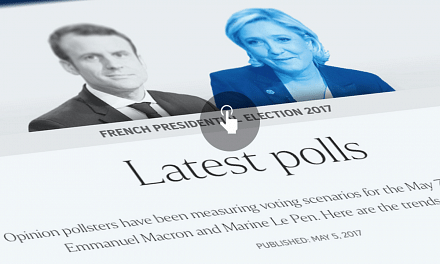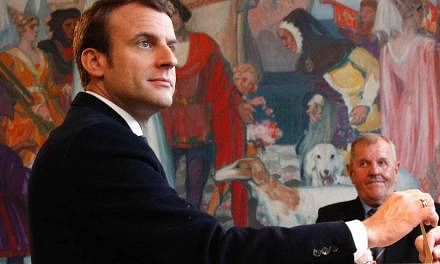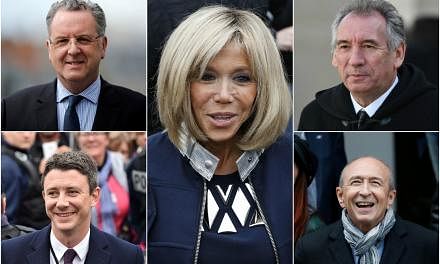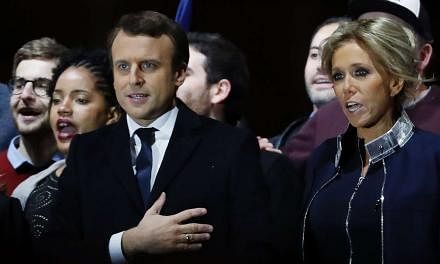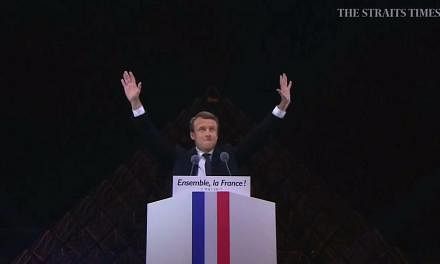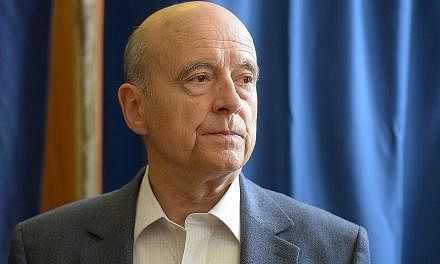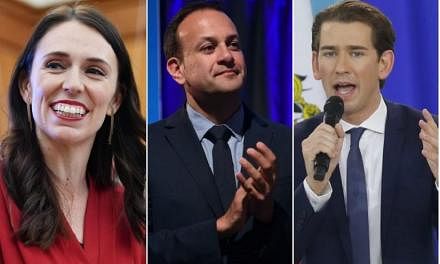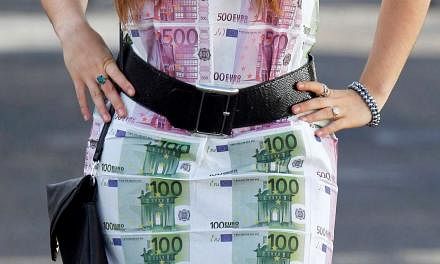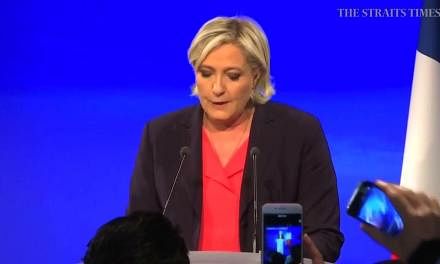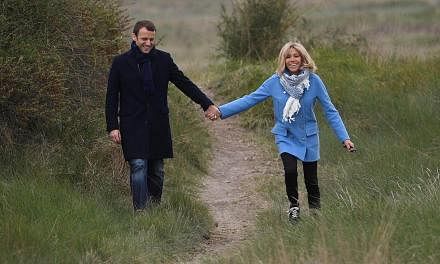"Where am I? I am in Lyon," French presidential candidate Jean-Luc Melenchon told a 10,000-strong crowd of supporters at a campaign rally. Seconds later, he snapped his fingers and an apparition of himself appeared before another 6,000 fans in the French capital saying "and now in Paris".
The leftist candidate certainly captured attention with the hologram stunt in February, but whether the €30,000 (S$45,000) to €40,000 it cost buys him enough votes to win the first round of voting on Sunday remains to be seen.
His team also released a satirical video game, Fiscal Combat, in which he literally shakes people down for money.
His appeal is not all about high-tech trickery, though. Supporters see him as the voice of the masses, while critics dismiss him as a populist demagogue or a dreamer.
At age 65, the two-time candidate for president and former government minister has been a fixture on the political scene since the 1980s. Yet, the leader of the France Unbowed campaign has risen dramatically in the polls, moving from being the joker in the pack to a wild card who may deal pundits and politicians alike an unexpected hand.
Mr Melenchon is particularly popular with the young, many of whom are otherwise disengaged from politics but approve of his anti-austerity message and opposition to military interventions.
In the last days before Sunday's poll, he has targeted poorer regions of France, including the often forgotten industrial north of France - a world away from the chic bistros and fashion outlets of central Paris.
The firebrand's popularity skyrocketed after a strong performance in televised debates. He also benefited from a collapse in support for Mr Benoit Hamon of the governing Socialist party. In recent weeks, Mr Melenchon's poll numbers have almost doubled.
His policies include further shortening France's 35-hour working week, lowering the retirement age, increasing social security payments, leaving Nato, blocking trade deals, putting an end to France's nuclear energy programme and a 100 per cent tax rate for high earners.
The often caustic politician also wants to reduce the power of what he calls France's "presidential monarchy". The insurgent cocks a snoot at France's establishment in other ways, too. Like his far-right opponent, National Front leader Marine Le Pen, he has promised to renegotiate France's relationship with the European Union - much as Britain's former prime minister David Cameron did last year, precipitating the country's Brexit vote.
While it is impossible to say if Mr Melenchon will make it to the final round of voting, he is now jockeying for third position with the conservative Francois Fillon. An Ipsos-Sopra Steria poll places the four leading candidates - Mr Melenchon, Ms Le Pen, Mr Fillon and centrist Emmanuel Macron - within the three-point margin of error.
But will Mr Melenchon's momentum carry him into the election's two-candidate second round on May 7?
One Parisian says his rise could come to an end when hard economic realities kick in. "Melenchon is very bright and he speaks well, but when you are behind the curtain it's a different story," he said. A woman, who also declined to be named, complained about Mr Melenchon's net worth: "He is rich," she said, before repeating the old anarchist slogan: "No gods, no masters."
Mr Melenchon's own rhetoric is equally fiery, referring to tax evasion as an act of "intolerable parasite" - and damning the "Uberisation" of the economy.
He has also been unsparing in his criticism of fellow politicians: In 2014, he called outgoing President Francois Hollande, then embroiled in a scandal about a love affair, an "oaf". Speaking at a rally in Lille last week, he said: "If you elect these three (Mr Macron, Mr Fillon and Ms Le Pen), you will spit blood."
Having left the Socialist party in 2008 to start his own left party, his France Unbowed campaign includes backing from a number of other outfits, including France's venerable, but diminished Communist Party. Mr Macron, whom many expect to win, questioned the leftist's bona fides, saying: "The revolutionary communist, he was a Socialist senator when I was still in college."
His controversial utterances include perceived anti-German sentiment and, like his conservative rival Mr Fillon, he is also seen as being soft on Russia as a result of his opposition to sanctions.
Whatever the outcome of Sunday's polling, his surge has certainly thrown France's already chaotic election into disarray.
